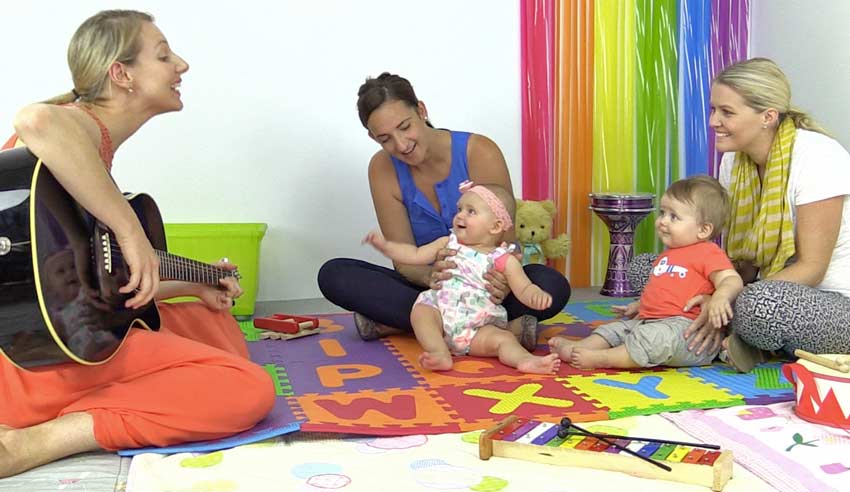Benefits of Music for Babies
Research tells us that there are many benefits of doing music with your child from a young age. Let’s take a look at some of the key benefits.
The Three Key Benefits of Doing Music With Your Baby
- Brain development: Musical activity contributes to better memory and cognitive skills. Music exercises the brain – when a baby listens to music or sings along with nursery rhymes, both sides of their brain are accessed at the same time. Adding movement to this boosts mind-body brain development as well.
- Language and literacy development: Music supports spoken language, receptive language, and phonemic awareness – or how well a child can hear, recognise, and use different sounds. All these opportunities encourage children to practice logical and reasoning skills. Songs and rhymes teach baby new words, increasing their vocabulary. Action songs such as finger plays help them attach words to meanings. These pre-literacy skills which will help your child to talk, read and learn as they grow older.
- Musical development: Regular participation in music activities during the early childhood years, will assist your child’s future development of musical skills.

Musical Skills in Early Childhood
Starting baby early is a great way to fast track the future development of musical skills such as:
- A musical ear
- Confidence using their singing voice
- A sense of beat (the steady pulse) and rhythm (the duration of sounds)
- A sense of pitch (how high or low a note is)
- An understanding of other musical elements such as dynamics (loud and soft), tempo (fast and slow), form and tone colour.
Active music making offers the greatest benefits
‘Active’ music making is very different to putting on a CD while your baby plays or goes to sleep. Being active includes a range of activity types which are all covered in my structured 8 session program.
- Say Sing Do – live singing/saying (by you) of traditional songs and rhymes that have been passed down from generation to generation; action songs demonstrated by you, which connect words to actions.
- Listen and Move – listening to a variety of musical styles and moving to the music ie. you move baby’s body parts or hold him in your arms as you move and dance so that he can feel the rhythm of the music.
- Play Our Instruments – working together with your infant to play percussion instruments, taking turns and keeping the beat.
- Musical Play – incorporating props such as bubbles, scarves, feathers etc into music activities provides baby with a multi-sensory experience (ie. their sense of hearing and sense of sight). These activities also show baby that music is participatory and fun which encourages both musical and social development.
- Lullabies – singing lullabies to your baby soothes and makes them feel secure.
- Welcome and Goodbye Songs – the repetition of these songs lets baby know what to expect and helps them learn about about social greetings ie. saying hello and waving goodbye.
Research on music and babies
Research supports the benefits of music activities for babies. Studies have shown that babies who experience music interactively with their parents:
- Smile more and are easier to soothe (emotional regulation)
- Develop better early communication skills (ie. pointing at objects, waving goodbye)
- Develop fine motor skills (gripping and squeezing instruments) and gross motor skills (moving body to music)
- Develop earlier sensitivity to the pitch structure in music.
Give your baby a head start in life and start boosting their learning and development. Learn more about The Bubble Box program.
Join my 8 session online program of 100+ music activities for you and bub.
If a face-to-face music class isn't practical for you or your baby/toddler, consider my online program! I'll teach you how to do music with your little one in the comfort of your own home. I sing and demonstrate the actions - you’ll soon be singing along, sharing smiles and giggles and feeling great for playing an active role in your baby’s development.
30 minutes a week = a lifetime of developmental benefits.
